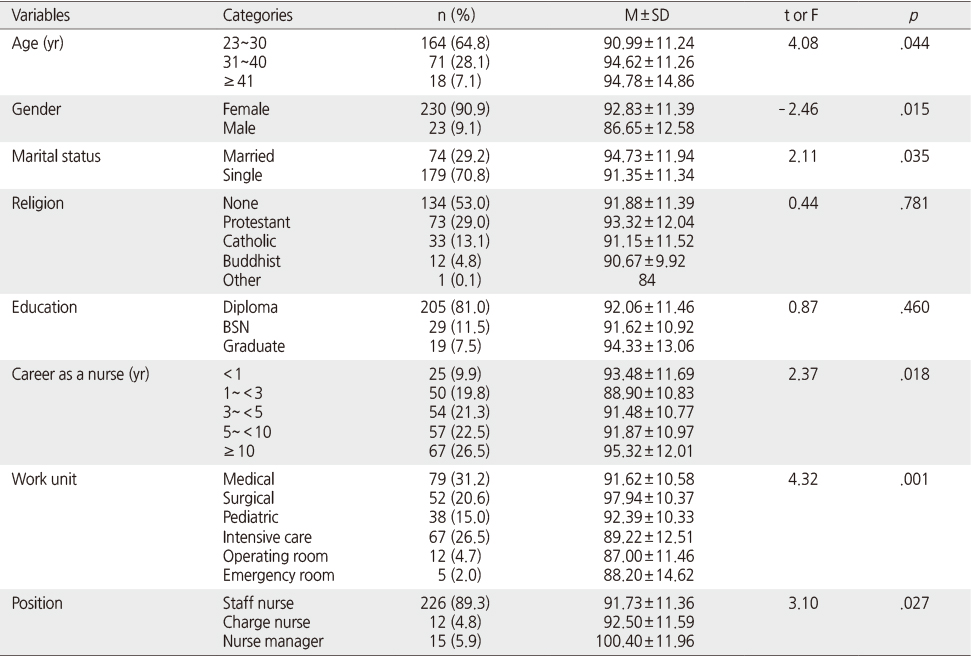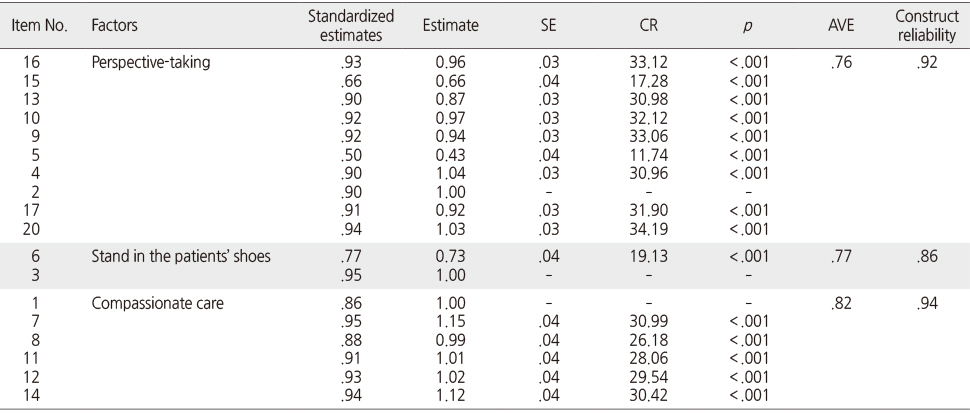Articles
- Page Path
- HOME > J Korean Acad Nurs > Volume 46(2); 2016 > Article
-
Original Article
- A Validation Study of the Korean Version of the Jefferson Empathy Scale for Health Professionals for Korean Nurses
- Hye-Ran Ryu, Kyung-Sook Bang
-
Journal of Korean Academy of Nursing 2016;46(2):207-214.
DOI: https://doi.org/10.4040/jkan.2016.46.2.207
Published online: April 29, 2016
1Seoul National University Hospital·College of Nursing, Seoul National University, Seoul, Korea.
2College of Nursing·The Research Institute of Nursing Science, Seoul National University, Seoul, Korea.
- Address reprint requests to: Bang, Kyung-Sook. College of Nursing, Seoul National University, 103 Daehak-ro, Jongno-gu, Seoul 03080, Korea. Tel: +82-2-740-8819, Fax: +82-2-765-4103, ksbang@snu.ac.kr
© 2016 Korean Society of Nursing Science
This is an Open Access article distributed under the terms of the Creative Commons Attribution NoDerivs License. (http://creativecommons.org/licenses/by-nd/4.0/) If the original work is properly cited and retained without any modification or reproduction, it can be used and re-distributed in any format and medium.
Abstract
-
Purpose
- To validate the Korean Version of the Jefferson Empathy Scale for Health professionals (K-JSE-HP) in a sample of Korean nurses.
-
Methods
- Internal consistency reliability, construct and criterion validity were calculated using SPSS (22.0) and AMOS (22.0). Data were collected from 253 nurses (230 women, 23 men) working at one university hospital in Seoul, South Korea.
-
Results
- The Korean version of JSE-HP showed reliable internal consistency with Cronbach's alpha for the total scale of .89, and .74~.84 for subscales. The model of three subscales for the K-JSE-HP was validated by confirmatory factor analysis (χ2=864.60, Q=6.55, p<.001, CFI=.94, NNFI=.92). Criterion validity compared to the Interpersonal Reaction Index (IRI) showed significant correlation.
-
Conclusion
- The findings of this study demonstrate that the Korean JSE-HP shows satisfactory construct and criterion validity and reliability. It is a useful tool to measure Korean nurses' empathy.
- 1. Watson J. The theory of human caring: Retrospective and prospective. Nurs Sci Q. 1997;10(1):49–52. ArticlePubMedPDF
- 2. Halldórsdóttir S. Feeling empowered: A phenomenological case study of the lived experience of health. In: Fridlund B, Hildingh C, editors. Qualitative research methods in the service of health. Lund, SE: Studentlitteratur; 2000. p. 82–96.
- 3. Coetzee SK, Klopper HC. Compassion fatigue within nursing practice: A concept analysis. Nurs Health Sci. 2010;12(2):235–243. ArticlePubMed
- 4. Kalisch BJ. What is empathy? Am J Nurs. 1973;73(9):1548–1552.ArticlePubMed
- 5. Davis MH. A multidimensional approach to individual differences in empathy. JSAS Cat Sel Doc Psychol. 1980;10:85.
- 6. Sayumporn W, Gallagher S, Brown P, Evans J, Flynn M, Lopez V. The perceptions of nurses in their management of patients experiencing anxiety. J Nurs Educ Pract. 2012;2(3):38–45. Article
- 7. Veloski JJ, Hojat M. Measuring specific elements of professionalism: Empathy, teamwork, and lifelong learning. In: Stern DT, editor. Measuring medical professionalism. Oxford, UK: Oxford University Press; 2006. p. 117–145.
- 8. Cho NO, Hong YS, Han SS, Um YR. Attributes perceived by cancer patients as a good nurse. Clin Nurs Res. 2006;11(2):149–162.ArticlePDF
- 9. La Monica EL. Construct validity of an empathy instrument. Res Nurs Health. 1981;4(4):389–400. ArticlePubMed
- 10. Davis MH. Measuring individual differences in empathy: Evidence for a multidimensional approach. J Personal Soc Psychol. 1983;44(1):113–126. Article
- 11. Hojat M, Mangione S, Nasca TJ, Cohen MJM, Gonnella JS, Erdmann JB, et al. The Jefferson scale of physician empathy: Development and preliminary psychometric data. Educ Psychol Meas. 2001;61(2):349–365. ArticlePDF
- 12. Baron-Cohen S, Wheelwright S. The empathy quotient: an investigation of adults with Asperger syndrome or high functioning autism, and normal sex differences. J Autism Dev Disord. 2004;34(2):163–175. ArticlePubMed
- 13. Yu J, Kirk M. Evaluation of empathy measurement tools in nursing: Systematic review. J Adv Nurs. 2009;65(9):1790–1806. ArticlePubMed
- 14. Kim IS. An investigation on reliability and validity of the Korean medical students' empathy rating scale [master's thesis]. Seoul, Kyung Hee University. 2005.
- 15. Kang WS. An investigation on reliability and validity of the Korean physician empathy rating scale [master's thesis]. Seoul, Kyung Hee University. 2007.
- 16. Lee YJ. Understanding of factor analysis. Seoul: Sukjungbooks; 2002.
- 17. Hojat M, Gonnella JS, Nasca TJ, Mangione S, Vergare M, Magee M. Physician empathy: Definition, components, measurement, and relationship to gender and specialty. Am J Psychiatry. 2002;159(9):1563–1569. ArticlePubMed
- 18. Fields SK, Hojat M, Gonnella JS, Mangione S, Kane G, Magee M. Comparisons of nurses and physicians on an operational measure of empathy. Eval Health Prof. 2004;27(1):80–94. ArticlePubMedPDF
- 19. Park SH. Empathy and empathic understanding. Seoul: Wonmisa; 1994.
- 20. Kim D. Amos A to Z: Structural equation modeling analysis. Paju: Yspub; 2008.
- 21. Fornell C, Larker DF. Evaluating structural equation models with unobservable variables and measurement error. J Mark Res. 1981;18(1):39–50. ArticlePDF
- 22. Lee H, Lim J. Structural equation modeling with AMOS 16.0. Paju: Bobmunsa; 2009.
- 23. Bazarko D, Cate RA, Azocar F, Kreitzer MJ. The impact of an innovative mindfulness-based stress reduction program on the health and well-being of nurses employed in a corporate setting. J Workplace Behav Health. 2013;28(2):107–133. ArticlePubMedPMC
- 24. Tavakol S, Dennick R, Tavakol M. Psychometric properties and confirmatory factor analysis of the Jefferson scale of physician empathy. BMC Med Educ. 2011;11:54ArticlePubMedPMCPDF
- 25. Alcorta-Garza A, González-Guerrero JF, Tavitas-Herrera SE, Rodríguez-Lara FJ, Hojat M. Validity and reliability of the Jefferson scale of physician empathy in Mexican medial students. Salud Ment. 2005;28(5):57–63.
- 26. Kataoka HU, Koide N, Ochi K, Hojat M, Gonnella JS. Measurement of empathy among Japanese medical students: Psychometrics and score differences by gender and level of medical education. Acad Med. 2009;84(9):1192–1197. ArticlePubMed
- 27. Kim JH, Shin S, Park JH. A methodological quality assessment of South Korean nursing research using structural equation modeling in South Korea. J Korean Acad Nurs. 2015;45(2):159–168. ArticlePubMedPDF
- 28. Hojat M, Gonnella JS, Nasca TJ, Mangione S, Veloksi JJ, Magee M. The Jefferson scale of physician empathy: Further psychometric data and differences by gender and specialty at item level. Acad Med. 2002;77:10 Suppl. S58–S60. PubMed
- 29. Neumann M, Edelhäuser F, Tauschel D, Fischer MR, Wirtz M, Woopen C, et al. Empathy decline and its reasons: A systematic review of studies with medical students and residents. Acad Med. 2011;86(8):996–1009. ArticlePubMed
- 30. Figley CR. Compassion fatigue: Coping with secondary traumatic stress disorder in those who treat the traumatized. New York, NY: Brunner-Routledge; 1995.
REFERENCES
Figure & Data
REFERENCES
Citations

- From film to simulation: Mixed-methods study of learner-driven artificial intelligence-generated ethical dilemma scenarios and role-play to enhance ethical competence in nursing students
Bo Yeon Hwang, Mi Yu
Nurse Education in Practice.2026; 92: 104773. CrossRef - The impact of an empathy education programme on empathy, communication skills and emotional competency in nursing students: A quasi-experimental study
Eun Jeong Ko, Eun Ji Seo, Youngjin Lee, Jiyeon Ha, Suno Kim, Jin-Hee Park
Nurse Education in Practice.2025; 85: 104364. CrossRef - Factors Influencing Person-Centered Care Among Psychiatric Nurses in Hospitals
Ji Su Lee, Mi Heui Jang, Min Jung Sun
Healthcare.2024; 12(22): 2269. CrossRef - Levels of Empathy in Students and Professors with Patients in a Faculty of Dentistry
Víctor P. Díaz-Narváez, Joyce Huberman-Casas, Jorge Andrés Nakouzi-Momares, Chris Alarcón-Ureta, Patricio Alberto Jaramillo-Cavieres, Maricarmen Espinoza-Retamal, Blanca Patricia Klahn-Acuña, Leonardo Epuyao-González, Gabriela Leiton Carvajal, Mariela Pad
Behavioral Sciences.2024; 14(9): 817. CrossRef - Effectiveness of simulation-based interventions on empathy enhancement among nursing students: a systematic literature review and meta-analysis
Mi-Kyoung Cho, Mi Young Kim
BMC Nursing.2024;[Epub] CrossRef - Development of an intentional rounding protocol for nursing undergraduates to apply in clinical practice
Sueun Kim, Jong Sun Ok, Jin Yi Choi, Heejung Choi
The Journal of Korean Academic Society of Nursing Education.2023; 29(4): 381. CrossRef - A Quasi-experimental Study Measuring the Effectiveness of Two Empathy Enhancement Programs on Caregivers Working with Older Adults Living Alone
Areum Han, Tae Hui Kim
Clinical Gerontologist.2022; 45(5): 1253. CrossRef - Effectiveness of empathy enhancement programs for social workers working with older adults: A quasi-experimental study
Areum Han, Tae Hui Kim
Journal of Social Work.2021; 21(4): 913. CrossRef - A Simulation-Based Empathy Enhancement Program for Non-Medical Care Providers of Older Adults: A Mixed-Methods Study
Areum Han, Tae Hui Kim
Psychiatry Investigation.2021; 18(2): 132. CrossRef - Factors Influencing Performance of Pain Assessment and Pain Intervention for Dementia Patients among Long-term Care Hospital Nurses
Mi Seon Jeon, Chi Eun Song, Jeong Min Park, Weon Gyeong Kim
Korean Journal of Adult Nursing.2020; 32(3): 283. CrossRef - The Effects of Empathy and Gender Role Identity on Communication Competence in Nursing College Students
Hyun Sook Choi, Kyung Ae Kim, SankBok Lee, Hyeyoung Joung
Journal of Korean Critical Care Nursing.2020; 13(3): 41. CrossRef - Lived experiences toward moral distress among long-term care hospital nurses: A phenomenological approach
So young Lee, Jung A Kim
The Journal of Korean Academic Society of Nursing Education.2020; 26(2): 167. CrossRef - The role of empathy and psychological need satisfaction in pharmacy students’ burnout and well-being
Eun Cho, Soohyun Jeon
BMC Medical Education.2019;[Epub] CrossRef - Validation to the Spanish of the Jefferson empathy scale health professions students version and its psychometric properties in nursing students
María José Díaz Valentín, Margarita Garrido Abejar, Rosa María Fuentes Chacón, María Dolores Serrano Parra, María Elisa Larrañaga Rubio, Santiago Yubero Jiménez
Nurse Education in Practice.2019; 40: 102629. CrossRef - A Predictive Model on Patient-Centered Care of Hospital Nurses in Korea
Hyun Jeong, Myonghwa Park
Journal of Korean Academy of Nursing.2019; 49(2): 191. CrossRef - The Influence of Lateral Violence on Burnout and Empathy with Patients among Nurses: The Moderating Effect of Communication
Soohyun Nam, Boyoung Hwang
Stress.2019; 27(3): 224. CrossRef - Validation Study of the Korean Version of the Jefferson Scale of Empathy-Health Professions Students for Measuring Empathy in Undergraduate Nursing Students
Jisoon Kim, Sukhee Ahn
Journal of Korean Academic Society of Nursing Education.2018; 24(3): 259. CrossRef - Factors associated with Nurses' Moral Sensitivity
Sohee Eom, Suk-Sun Kim
Journal of Korean Academy of Psychiatric and Mental Health Nursing.2018; 27(3): 199. CrossRef
Comparisons on Scores of the K-JSE by General Characteristics of Nurses (N=253)
BSN=Bachelor of science in nursing.
Fitness Statistics of the Hypothetical Model
Analysis of Convergent Validity of Items
SE=Standard error; CR=Critical ratio; AVE=Average variance extracted.
Correlations Coefficients between Factors
AVE=Average variance extracted; ( )=r2.
BSN=Bachelor of science in nursing.
SE=Standard error; CR=Critical ratio; AVE=Average variance extracted.
AVE=Average variance extracted; ( )=r2.
 KSNS
KSNS
 E-SUBMISSION
E-SUBMISSION




 Cite
Cite

